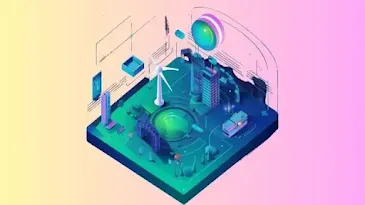Accelerated computing and artificial intelligence (AI) are transforming organizations by encouraging energy conservation and offering innovative solutions to urgent environmental problems worldwide.
While AI systems do, of course, consume energy, the important news here is how AI and faster computation are helping other systems save energy. Take data centers as an illustration.They are the cornerstone of artificial intelligence (AI), housing the resilient systems needed to handle the data that AI needs to operate in applications such as chatbots, AI-enabled search, and content production. The 2% of data centers worldwide that use energy are AI-specific facilities. This is a very modest percentage.
However, AI's real strength lies in its capacity to optimize
How? through the utilization of accelerated computing systems that combine GPUs and CPUs. GPUs are made to quickly and efficiently perform complex computations.These developments have resulted in significant gains in energy efficiency over the previous eight years, and partly explain why AI can now handle more complex problems.
Accelerated Computing: What Is It?
At its core, accelerated computing is about doing more with less. It means making use of specialist technology, such as GPUs, to complete tasks faster and with less energy. Accelerated computing allows businesses to grow their AI operations without consuming a lot of energy.
AI's ability to tackle some of the most important environmental problems of our time hinges on how energy-efficient it is.
AI at Work: Combating Global Warming
AI is not only saving electricity but also battling climate change.
artificial intelligence as well as speed Weather and climate simulation are being revolutionized by Accelerated Computing in general.
For instance, because AI-enhanced weather forecasting is becoming more accurate, businesses and governments may better prepare for climate-related disasters like hurricanes and floods.
Our ability to properly prepare for these disasters thanks to NIVIDIA's ability to foresee them will reduce harm and waste of resources.
Another significant tendency is the rise of "digital twins," or virtual renditions of actual environments.
With these AI-powered simulations, businesses can now improve energy use in real time without needing to make costly physical alterations to the surroundings.
Even while it might not seem like much, applying it to multiple places has a significant impact.
Artificial intelligence plays a crucial role in the creation of novel materials for renewable energy technologies, such as electric automobiles and solar panels, which will accelerate the shift to clean energy.
Is Data Center Sustainability Improved by AI?
As AI develops, it will need more processing power and data centers. Data centers, however, don't always require a lot of energy. They might even help find a sustainable solution.
Direct-to-chip liquid cooling is a noteworthy innovation. With the use of this technology, data centers can now cool their systems far more efficiently than they could with more energy-intensive traditional air conditioning approaches.
The primary goal of the suggested design for the data centers for a new B200 chip is direct-to-chip liquid cooling. By directly cooling data centers at the chip level and maintaining them cold without requiring excessive power, this method lowers energy usage.
As AI becomes more and more common, data centers of the future will need to be constructed with energy efficiency from the ground up.
This means utilizing renewable energy sources, adopting energy storage technologies, and staying abreast of advancements in cooling technology.
Building ecologically friendly data centers that can satisfy the world's expanding need for processing capacity while reducing their carbon footprint is the aim.
The Role of AI in Building a Sustainable Future
Not only is artificial intelligence a tool for system improvement, but it also serves as a spur for sustained innovation.
By enhancing energy grid efficiency and supply chain management, artificial intelligence is cutting waste and pollution.
The best tool we've ever seen to assist us achieve more sustainability and more sustainable outcomes will be artificial intelligence (AI).





.jpg)






0 Comments